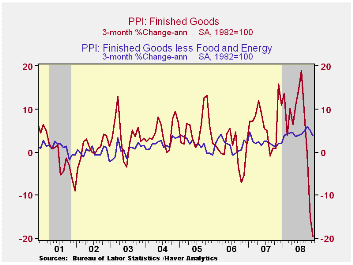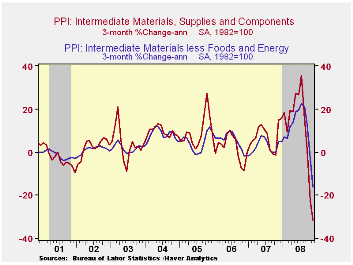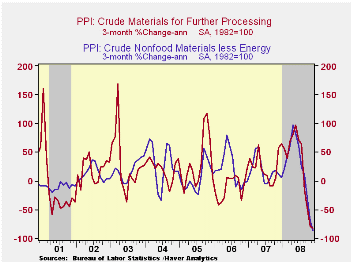 Global| Dec 12 2008
Global| Dec 12 2008U.S. PPI Fell Again; Core Pricing Power Eased
by:Tom Moeller
|in:Economy in Brief
Summary
Last month U.S. finished producer prices fell 2.2%, about as they did during October when they were down 2.8%. Finished energy prices (-16.1% y/y) were down about as they were in October, by 11.2%. Gasoline prices led the decline with [...]

Last month U.S. finished producer prices fell 2.2%, about as they did during October when they were down 2.8%. Finished energy prices (-16.1% y/y) were down about as they were in October, by 11.2%. Gasoline prices led the decline with a one-third drop (-40.1% y/y).
Other oil based prices were down as well as home heating oil prices fell by one-quarter (-21.9% y/y). Natural gas prices fell for the fourth consecutive month but the 1.7% m/m decline left them still up 7.3% y/y. Bucking a steep downtrend residential electric power costs slipped 0.4% but they were up 6.5% y/y. (All of these energy price series are not seasonally adjusted.)
Finished consumer food prices were unchanged after their 0.2% drop during October. Strength in food prices still is evident in a 6.8% y/y gain led by a 18.5% rise in meat prices and a 10.1% rise in bakery product prices. Fresh & dried vegetable prices also were strong, up 12.1% y/y, but fruit prices fell 12.2%.
Less food & energy prices, the increase moderated to 0.1% after a 0.4% October rise. Consensus expectations were for a for a 0.1% uptick. The moderation follows four consecutive monthly increases between 0.4% and 0.6%. The y/y gain in the core PPI of 4.2% was near the strongest since late-1989. Prices of core finished consumer goods ticked up 0.1% (4.4% y/y), nearly the strongest since 1989. Durable consumer goods prices were unchanged (2.4% y/y). Appliance prices firmed and posted a 4.0% y/y rise following the 1.1% increase during 2007. Core nondurable goods prices also strengthened and rose 5.9% y/y, the fastest gain since early 1999. Prices for capital equipment also firmed. Though they ticked up just 0.1% last month, the 3.7% y/y gain is double the rise during last year and the strongest since 1989.
Intermediate goods prices fell 4.3% as energy prices dropped further. Excluding food & energy prices fell for the third consecutive month but the 2.3% m/m fall still left these prices up 6.4% y/y, more than double the increase last year.
The crude materials PPI was down sharply for the fourth straight month and the 12.5% decline about matched the earlier drops. Energy prices led the fall with an 18.7% (-28.8% y/y) drop. Crude food prices also were off 1.2% (-5.2% y/y). Less food & energy crude prices fell 20.4% with the drop in commodity prices.
| Producer Price Index (%) | November | October | Y/Y | 2007 | 2006 | 2005 |
|---|---|---|---|---|---|---|
| Finished Goods | -2.2 | -2.8 | 0.2 | 3.9 | 3.0 | 4.9 |
| Core | 0.1 | 0.4 | 4.2 | 1.9 | 1.5 | 2.4 |
| Intermediate Goods | -4.3 | -3.9 | 2.5 | 4.1 | 6.4 | 8.0 |
| Core | -2.3 | -1.7 | 6.4 | 2.8 | 6.0 | 5.5 |
| Crude Goods | -12.5 | -18.6 | -19.2 | 12.1 | 1.4 | 14.6 |
| Core | -20.4 | -17.0 | -22.2 | 15.6 | 20.8 | 4.9 |
Tom Moeller
AuthorMore in Author Profile »Prior to joining Haver Analytics in 2000, Mr. Moeller worked as the Economist at Chancellor Capital Management from 1985 to 1999. There, he developed comprehensive economic forecasts and interpreted economic data for equity and fixed income portfolio managers. Also at Chancellor, Mr. Moeller worked as an equity analyst and was responsible for researching and rating companies in the economically sensitive automobile and housing industries for investment in Chancellor’s equity portfolio. Prior to joining Chancellor, Mr. Moeller was an Economist at Citibank from 1979 to 1984. He also analyzed pricing behavior in the metals industry for the Council on Wage and Price Stability in Washington, D.C. In 1999, Mr. Moeller received the award for most accurate forecast from the Forecasters' Club of New York. From 1990 to 1992 he was President of the New York Association for Business Economists. Mr. Moeller earned an M.B.A. in Finance from Fordham University, where he graduated in 1987. He holds a Bachelor of Arts in Economics from George Washington University.
More Economy in Brief
 Global| Feb 05 2026
Global| Feb 05 2026Charts of the Week: Balanced Policy, Resilient Data and AI Narratives
by:Andrew Cates






